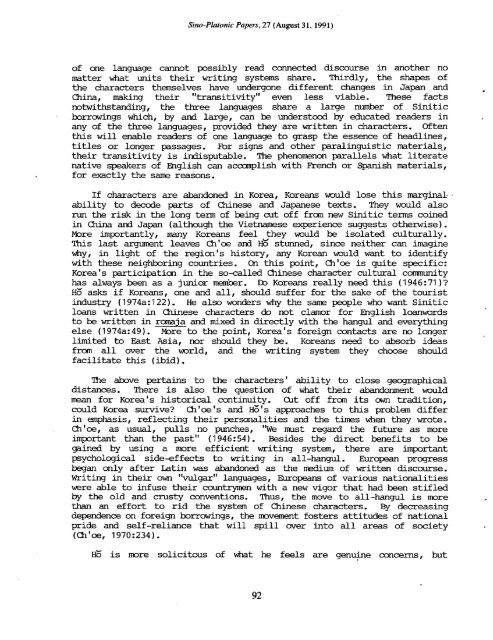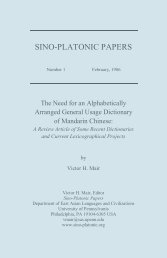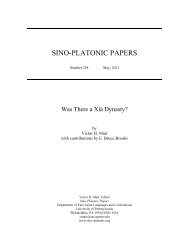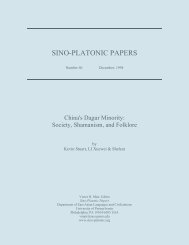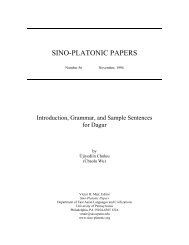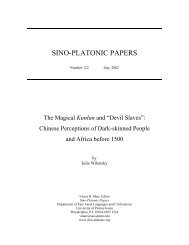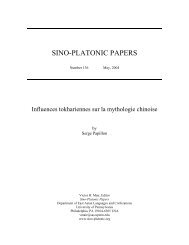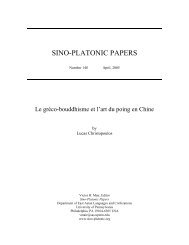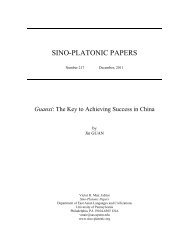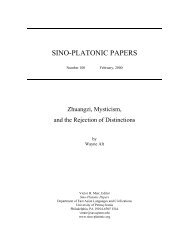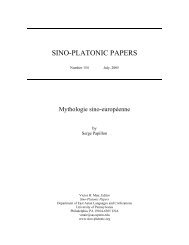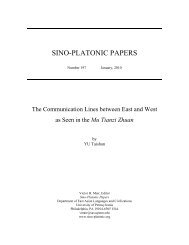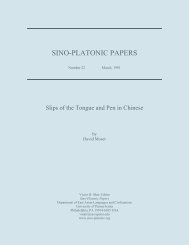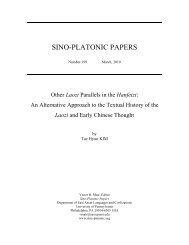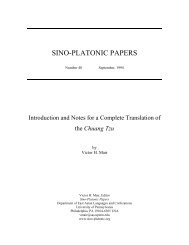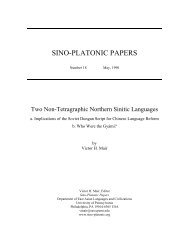Essays on Writing and Language in Honor - Sino-Platonic Papers
Essays on Writing and Language in Honor - Sino-Platonic Papers
Essays on Writing and Language in Honor - Sino-Platonic Papers
You also want an ePaper? Increase the reach of your titles
YUMPU automatically turns print PDFs into web optimized ePapers that Google loves.
Sim-Plat<strong>on</strong>ic <strong>Papers</strong>, 27 (August 31, 1991)<br />
of <strong>on</strong>e language cannot possibly read c<strong>on</strong>nected discourse <strong>in</strong> another no<br />
matter what units their writ<strong>in</strong>g systems share, Thirdly, the shapes of<br />
the characters themselves have underg<strong>on</strong>e different changes <strong>in</strong> Japan <strong>and</strong> -<br />
Ch<strong>in</strong>a, mak<strong>in</strong>g their "transitivity" even less viable. These facts<br />
notwithst<strong>and</strong><strong>in</strong>g, the three languages share a large number of S<strong>in</strong>itic<br />
borrow<strong>in</strong>gs which, by <strong>and</strong> large, can be understood by educated readers <strong>in</strong><br />
any of the three languages, provided they are written <strong>in</strong> characters. Often<br />
this will enable readers of <strong>on</strong>e language to grasp the essence of headl<strong>in</strong>es,<br />
titles - or l<strong>on</strong>ger passages, For signs <strong>and</strong> other paral<strong>in</strong>guistic materials.,<br />
their. transitivity is <strong>in</strong>disputable. The phenomen<strong>on</strong> parallels what literate<br />
native speaJers of Ehglish can accamplish with Rench or Spanish materials,<br />
for exactly the same reas<strong>on</strong>s.<br />
If characters are ab<strong>and</strong><strong>on</strong>ed <strong>in</strong> Korea, Koreans would lose this marg<strong>in</strong>al-<br />
ability to decode parts of Ch<strong>in</strong>ese <strong>and</strong> Japanese texts, They would also<br />
run the risk <strong>in</strong> the l<strong>on</strong>g term of be<strong>in</strong>g cut off from new S<strong>in</strong>itic terms co<strong>in</strong>ed<br />
<strong>in</strong> chi^ <strong>and</strong> Japan (although the Vietnamese experience suggests otherwise),<br />
More importantly, many Koreans feel they would be isolated culturally.<br />
This last argument leaves Ch'oe <strong>and</strong> Ho' stunned, s<strong>in</strong>ce neither can imag<strong>in</strong>e<br />
why, <strong>in</strong> light of the regi<strong>on</strong>'s history, any Korean would want to identify<br />
with these neighbor<strong>in</strong>g countries. this po<strong>in</strong>t, Ch'oe is quite specific:<br />
Korea's participatian <strong>in</strong> the so-called Ch<strong>in</strong>ese character cultural commmity<br />
has always been as a juniar member, Do Koreans really need this (1946:71)?<br />
HS asks if Koreans, <strong>on</strong>e <strong>and</strong> all, should suffer for the sake of the tourist<br />
<strong>in</strong>dustry (1974a:122), He also w<strong>on</strong>ders why the same people who want S<strong>in</strong>itic<br />
loans written <strong>in</strong> CZz<strong>in</strong>ese characters do not clamor for English loanwords<br />
to be written <strong>in</strong> r-ja <strong>and</strong> mixed <strong>in</strong> directly with the hangul <strong>and</strong> everyth<strong>in</strong>g<br />
else (1 974a: 49). More to the po<strong>in</strong>t, Korea's foreign c<strong>on</strong>tacts are no l<strong>on</strong>ger<br />
limited to East Asia, nor should they be. Koreans need to absorb ideas<br />
from all over the world, <strong>and</strong> the writ<strong>in</strong>g system they choose should<br />
facilitate this (ibid),<br />
The above perta<strong>in</strong>s to the characters' ability to close geographical<br />
distances, There is also the questi<strong>on</strong> of what their ab<strong>and</strong><strong>on</strong>ment would<br />
mean for Korea's historical c<strong>on</strong>t<strong>in</strong>uity. Cut off from its awn traditi<strong>on</strong>,<br />
could Korea survive? Ch'oe's <strong>and</strong> HZ'S approaches to this problem differ<br />
<strong>in</strong> emphasis, reflect<strong>in</strong>g their pers<strong>on</strong>alities <strong>and</strong> the times when they wrote.<br />
ol'oe, as usual, pulls no punches, "We must regard the future as more<br />
important than the past" (1946:54). Besides the direct benefits to be<br />
ga<strong>in</strong>ed by us<strong>in</strong>g a more efficient writ<strong>in</strong>g system, there are important<br />
psychological side-effects to writ<strong>in</strong>g <strong>in</strong> all-hangul. European progress<br />
began <strong>on</strong>ly after Lat<strong>in</strong> was ab<strong>and</strong><strong>on</strong>ed as the medium of written discourse,<br />
<strong>Writ<strong>in</strong>g</strong> <strong>in</strong> their own "vulgar" languages, Europeans of various nati<strong>on</strong>alities<br />
were able to <strong>in</strong>fuse their countrymen with a new vigor that had been stifled<br />
by the old <strong>and</strong> . crusty c<strong>on</strong>venti<strong>on</strong>s, Thus, the move to all-hangul is more<br />
than an effort to rid the system of Ch<strong>in</strong>ese characters. By decreas<strong>in</strong>g<br />
dependence <strong>on</strong> foreign borrow<strong>in</strong>gs, the movement fosters attitudes of nati<strong>on</strong>al<br />
pride <strong>and</strong> self-reliance that will spill wer <strong>in</strong>to all areas of society<br />
(Ql'oe, 1970:234).<br />
H is more solicitous of what he feels are genu<strong>in</strong>e c<strong>on</strong>cerns, but


